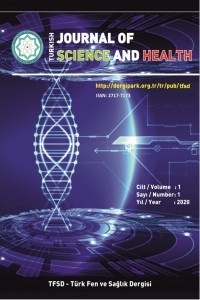8-12 YAŞ ARASI ÇOCUKLARIN COVID-19 VE KORUNMA ÖNLEMLERİNE YÖNELİK BİLGİ DÜZEYLERİNİN BELİRLENMESİ
Amaç: Bu çalışma 8-12 yaş çocukların Covid-19 ve korunma önlemleri hakkında bilgi düzeyini belirlemek amacıyla planlanmıştır.
Gereç ve Yöntem: Tanımlayıcı tipteki araştırmaya, 8-12 yaş arası 323 çocuk katılmıştır. Veriler araştırmacılar tarafından oluşturulan Tanıtıcı Özellikler Formu ve Covid-19 ve Korunma Önlemlerine Yönelik Bilgi Düzeyi Formu ile toplanmış, sayı, yüzde, ortalama, standart sapma ve ki-kare analizi ile gösterilmiştir.
Bulgular: Çalışmaya katılan çocukların yaş ortalamaları 9.15±1.28 ve %54.8’i kızdır. Çocukların %63.2’si Covid-19 ile ilgili bilgileri televizyondan öğrendiğini ifade etmiştir. Çocukların %90.1’i Covid-19’un hijyen alışkanlıklarını değiştirdiğini, %80.2’i Covid-19’dan korunmada en etkili önlemin maske takmak olduğunu, %99.4’ü el hijyenine daha çok dikkat ettiğini belirtmiştir. Hijyen ve korunma önlemlerine uyumun kız çocuklarında ve ailesinde Covid-19 enfeksiyonu geçirenlerde daha yüksek olduğu belirlenmiştir.
Sonuç: Çocukların çoğunluğunun Covid-19 ve korunma önlemleri hakkında bilgi sahibi olduğu, maske takma ve el hijyenine dikkat ettikleri belirlenmiştir. Enfeksiyonu taşıma ve bulaştırma açısından önemli bir grup olan çocukların konu hakkındaki eksik bilgilerinin giderilerek korunma önlemlerine uyumlarının sürekliliği sağlanmalıdır.
DETERMINING THE LEVEL OF KNOWLEDGE REGARDING COVID-19 AND PROTECTION MEASURES OF CHILDREN BETWEEN AGED 8-12 YEARS
Purpose: This study was conducted to determine the the knowledge level of aged 8-12 years children about Covid-19 and protection measures. Material and Methods: The sample of the descriptive study consisted of 323 children aged 8-12 years. The data were collected online with Descriptive Characteristics Form and the Information Level Form for Covid-19 and Protection Measures prepared by the researchers, and were shown with number, percentage, mean, standard deviation and chi-square analysis. Results: The mean age of the children 9.15 ± 1.28 and 54.8% were girls. 63.2% of the children stated that they learned information about Covid-19 from television. It was found that 90.1% of children stated that Covid-19 changed their hygiene habits, 80.2% of them stated that the most effective measure to protect against Covid-19 was wearing a mask, 99.4% paid more attention to hand hygiene. It has been determined that compliance with hygiene and protection measures is higher in girls and those who have had Covid-19 infection in their family. Conclusion: It has been determined that the majority of children have information about Covid 19 and protection measures and pay attention to wearing masks and hand hygiene. Children, who are an important group in terms of carrying and transmitting the infection, should ensure the continuity of their adaptation to protection measures by eliminating their missing information on the subject.
Keywords:
Child, Covid-19, information, protection,
___
- Abuhammad, S. (2020). Parents’ knowledge and attitude towards COVID-19 in children: A Jordanian Study. Int J Clin Pract, 00:e13671.
- Akoğlu, G., Karaaslan. B. (2020). COVID-19 ve İzolasyon Sürecinin Çocuklar Üzerindeki Olası Psikososyal Etkileri. İzmir Katip Çelebi Üniversitesi Sağlık Bilimleri Fakültesi Dergisi, 5 (2), 99-103.
- AAP. (2019). Children and COVID-19: State-Level Data Report. https://services.aap.org/en/pages/2019-novel-coronavirus-covid-19-infections/children-and-covid-19-state-level-data-report/
- Erdinç, S., Kaya, M.U., İrice, U. (2020). Covid-19 salgını döneminde evde iyi olma hâlini koruma rehberi. İstanbul: Anne Çocuk Eğitim Vakfı. https://www.acev.org/wp-content/uploads/2020/07/ACEV_CovidRehber_DijitalFinal.pdf
- Harper, C.A., Satchell, L.P., Fido, D., et al. (2020). Functional Fear Predicts Public Health Compliance in the COVID-19 Pandemic. Int J Ment Health Addict, Apr, 27,1-14. doi: 10.1007/s11469-020-00281-5. Kardeş, H., Örnek, Z. (2020). COVID-19 Pandemisine Pediatrik Yaklaşım. Türkiye Diyabet ve Obezite Dergisi, 4 (2) , 170-176. DOI: 10.25048/tudod.756682 Ludvigsson, J.F. (2020).Systematic review of COVID-19 in children show milder cases and a better prognosis than adults. Acta Paediatri, 109(6), 1088-1095. doi: 10.1111/apa.15270
- Palanbek Yavaş, S., Arga, G. (2020). Covid-19 ve çocuklar; şimdiye kadar neler öğrendik? ESTÜDAM Halk Sağlığı Dergisi, 5, 96-107. Pars, H. (2020). COVID-19 Pandemisinde Çocuklar ve Pediatri Hemşiresinin Rolleri. Hacettepe Üniversitesi Hemşirelik Fakültesi Dergisi , 7(Özel Sayı), 66-75.
- Persici Toniolo, B., Baptista, J.P., Ramos, C., et al. (2021). General Knowledge and Perception of Portuguese Children About COVID-19. In: Rocha Á., Ferrás C., López-López P.C., Guarda T. (eds) Information Technology and Systems. ICITS 2021. Advances in Intelligent Systems and Computing, vol 1331. Springer, Cham. https://doi.org/10.1007/978-3-030-68418-1_19
- UNICEF. (2019). Çocuğunuza Koronavirüs 2019’dan (COVID-19) nasıl söz etmelisiniz? https://www.unicef.org/turkey/hikayeler/%C3%A7ocu%C4%9Funuza-koronavir%C3%BCs-2019dan-covid-19-nas%C4%B1l-s%C3%B6z-etmelisiniz
- UNICEF. (2020). COVID-19 ve maske: Aileler için İpuçları. https://www.unicef.org/turkey/covid-19-ve-maske-aileler-i%C3%A7in i%CC%87pu%C3%A7lar%C4%B1
- WHO. (2019). Coronavirus disease (COVID-19) pandemic. https://www.who.int/emergencies/diseases/novel-coronavirus-2019
- WHO. (2020). Life skills education school handbook: prevention of noncommunicable diseases - Approaches for schools. Geneva: World Health Organization. Licence: CC BY-NC-SA 3.0 IGO. https://apps.who.int/iris/bitstream/handle/10665/331947/9789240005020-eng.pdf?sequence=1&isAllowed=y
- Xue, Q., Xie, X., Liu, Q., et al. (2020). Knowledge, attitudes, and practices towards COVID-19 among primary school students in Hubei Province, China. Child Youth Serv Rev. 2021 Jan;120:105735. doi: 10.1016/j.childyouth.2020.105735. Epub 2020 Nov 19. PMID: 33235402; PMCID: PMC7676362.
- Yavaş Çelik, M. (2021). The Effects of COVID-19 on Child Health. J Educ Res Nurs,18(Supp. 1), 30-35.
- Yüksek Usta, S., Gökcan, H . (2020). Çocukların ve annelerinin gözünden Covid-19. International Journal of Social Sciences and Education Research, 6 (2),187-206 .
- Başlangıç: 2020
- Yayıncı: Ümit Muhammet KOÇYİĞİT
Sayıdaki Diğer Makaleler
Antiviral Effects of Some Flavonoids on SARS-CoV-2
Aynur MÜDÜROĞLU KIRMIZIBEKMEZ, Cihan Mehmet ALTINTAŞ, Ali ARSLAN, Ihsan KARA
DEPRESİF SEMPTOM YAŞAYAN GEBELERİN PRENATAL BAĞLANMA DÜZEYLERİNİN İNCELENMESİ
A Case of Psoriasis After Narrow Band UVB (NBUVB) Phototherapy for Vitiligo Treatment
Mustafa TOSUN, İlknur KÜÇÜKOSMANOĞLU
The Anticancer Effect of Cannabinoid 2 Agonist L-759,633 on C6 and SH-SY5Y Cell Lines
Zıad JOHA, Fatih YULAK, Ayşegül ÖZTÜRK, Bilal ŞAHİN, Şahin YILDIRIM
Ümmühan YİĞİT, Arzu İLÇE, İbrahim KARAGÖZ
Muhammed GÖMEÇ, Mustafa Asım GEDİKLİ
Mustafa TOSUN, Rukiye YASAK GÜNER, Sibel BERKSOY HAYTA, Melih AKYOL, Serkan ÇELİKGÜN
